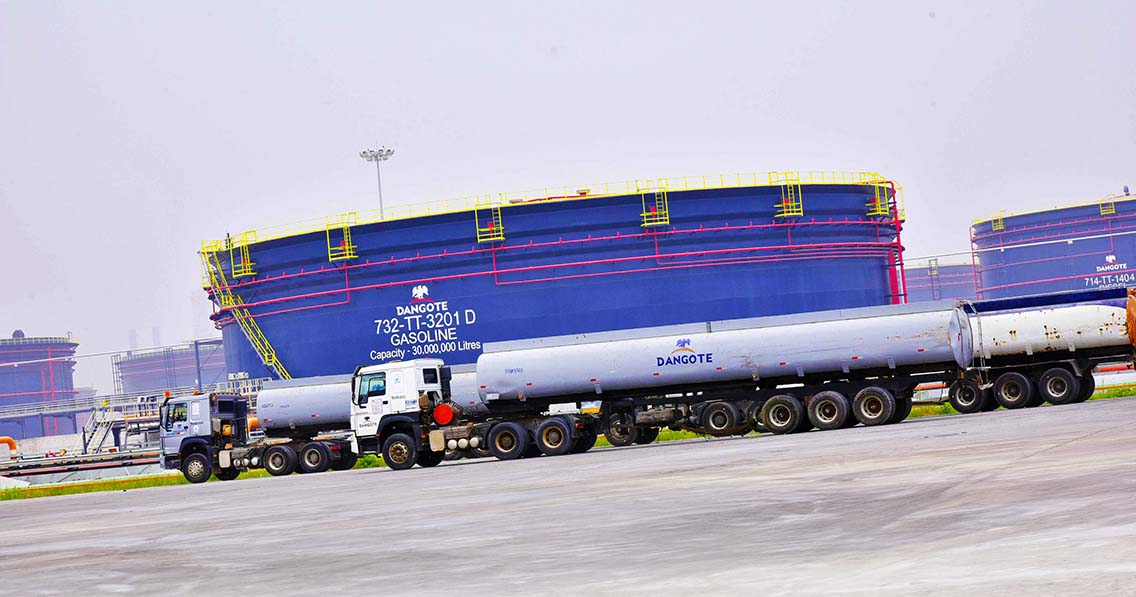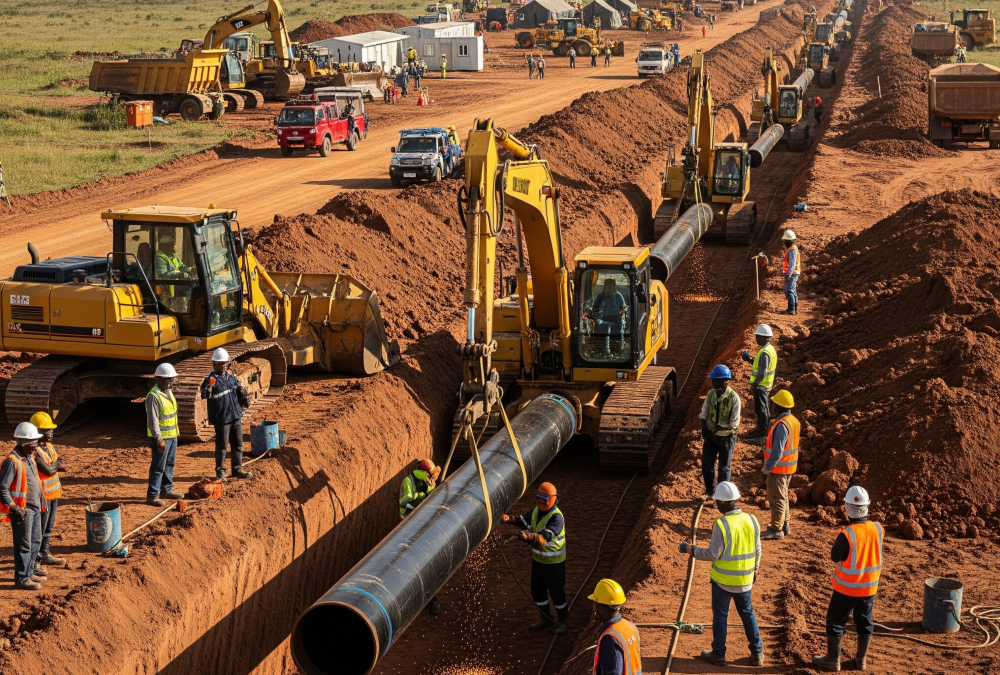Nigeria’s $20 billion Dangote Refinery has already begun reshaping the country’s fuel supply landscape, cutting petrol imports by more than half in early 2025. But can it truly end decades of dependency on imported petrol? The answer lies at the intersection of refinery capacity, crude supply, foreign exchange stability, logistics, and government policy.
Dangote’s Immediate Impact
The Dangote Petroleum Refinery, with its 650,000 barrels per day (bpd) capacity, has emerged as Africa’s largest refining project and a potential game changer for Nigeria’s energy independence. Since beginning operations, the refinery has supplied petrol directly to filling stations in select states, breaking the long-standing reliance on foreign imports.
Official data shows petrol imports fell by more than 50% in the first quarter of 2025 compared to the same period in 2024. This decline represents billions in foreign exchange savings for a country that has historically spent tens of billions annually importing petrol. Yet, despite the refinery’s rapid entry into the market, Nigeria still spent about N4 trillion on fuel imports in just the first half of 2025, signaling that the transition is incomplete.
Why Dangote Can End Import Dependency
1. Refining Capacity That Matches Domestic Demand
Nigeria consumes an estimated 50 to 60 million liters of petrol daily. At full operation, Dangote Refinery’s output can not only meet this demand but also produce surplus refined products for export. In scale alone, the refinery is capable of replacing nearly all imports.
2. Tangible Proof of Import Reduction
The sharp drop in import bills is not theoretical; it is already visible. Tankers once docked in Lagos with refined petrol have significantly reduced, as Dangote begins to dominate domestic supply.
3. Direct-to-Station Distribution Model
By bypassing middlemen and delivering petrol directly to filling stations, Dangote is lowering transportation costs and cutting layers of markups. In its pilot program across 11 states, pump prices have stabilized compared to past volatility, offering relief to consumers.
4. Supportive Policy Environment
The Nigerian government has shown readiness to enforce local crude allocations, requiring producers to supply domestic refineries before exporting. This policy shift strengthens Dangote’s ability to secure feedstock and scale production.
Also read: Dangote to Start Direct Petrol Supply Across 11 States, with Lower Prices and Free Delivery
Why Imports Will Not Disappear Overnight
1. Crude Feedstock Challenges
Refining capacity means little without steady crude supply. Nigerian oil producers often prefer exporting crude for higher dollar returns, creating friction. While the government has introduced quotas, pricing disputes and enforcement challenges remain unresolved.
2. Currency Mismatches
Dangote buys crude oil in U.S. dollars but sells petrol in naira. This creates a financial strain whenever the naira depreciates, raising operational costs and complicating pricing. Until Nigeria stabilizes its foreign exchange regime, this mismatch will remain a barrier.
3. Logistics and Infrastructure Gaps
Nigeria’s nationwide fuel distribution depends on depots, pipelines, trucks, and storage facilities. Dangote has started addressing this through direct delivery, but scaling to all 36 states will take years of investment in infrastructure.
4. Resistance from Market Stakeholders
Fuel importers, depot owners, and marketers who once dominated the industry may resist Dangote’s growing monopoly. Such resistance could manifest in regulatory disputes, legal action, or lobbying for policy shifts, slowing down full market transition.
5. Residual Import Needs
Even with near-total self-sufficiency, Nigeria may still need to import petrol during refinery maintenance shutdowns, supply disruptions, or sudden demand spikes. Strategic reserves can reduce but not eliminate this need.
Short-, Medium-, and Long-Term Outlook
- Short Term (6–12 months): Imports will continue but at reduced levels. Nigeria will still depend on foreign petrol to fill supply gaps as Dangote scales.
- Medium Term (1–3 years): With stable crude allocations, expanded logistics, and financial mechanisms to handle FX, Nigeria could achieve near self-sufficiency.
- Long Term (3+ years): Full independence from imports is possible if policy support continues and Dangote maintains consistent output. Occasional imports may remain necessary, but they would represent a fraction of today’s levels.
Conditions for Success
To fully end petrol imports, Nigeria must address several key conditions:
- Stable Crude Supply: Oil producers must commit long-term contracts with Dangote at competitive prices.
- Foreign Exchange Solutions: Government-backed mechanisms to cushion the dollar–naira mismatch will be vital.
- Infrastructure Expansion: Tank farms, pipelines, and depots must be expanded to distribute petrol efficiently nationwide.
- Regulatory Transparency: Fair competition rules must ensure Dangote’s dominance does not stifle smaller players or inflate prices.
- Strategic Reserves: Nigeria needs national stockpiles to cover refinery downtime and emergencies.
Economic Impacts
Ending petrol import dependency has implications beyond energy supply.
- Foreign Exchange Savings: Nigeria can save billions annually, reducing pressure on its struggling currency.
- Job Creation: Refinery operations and expanded logistics will create jobs across the value chain.
- Industrial Growth: Availability of by-products like diesel, jet fuel, and petrochemicals could stimulate other industries.
- Geopolitical Positioning: Nigeria could transition from a major importer to a regional exporter, enhancing its energy diplomacy.
Also read: Libya Drills New Gas Well to Strengthen Energy Supply and Exports
Frequently Asked Questions (FAQ)
- Has Nigeria stopped importing petrol completely because of Dangote Refinery?
Not yet. Petrol imports have dropped sharply since Dangote began operations, but Nigeria still spends billions on imports. Full independence will take time as crude supply, FX, and logistics challenges are resolved. - Can Dangote Refinery meet Nigeria’s entire petrol demand?
Yes, on paper. With a capacity of 650,000 barrels per day, the refinery can meet Nigeria’s daily consumption of 50–60 million litters. However, stable crude supply and distribution infrastructure are critical to achieving this. - Why does Nigeria still import fuel if Dangote is producing locally?
Imports are needed to cover supply gaps caused by refinery ramp-up, crude supply issues, maintenance shutdowns, or distribution bottlenecks. - How does Dangote Refinery affect fuel prices in Nigeria?
Direct supply to stations has helped stabilize prices and reduce logistics costs. However, exchange rate fluctuations and policy changes still influence pump prices. - What other benefits does the refinery bring besides reducing imports?
The refinery is expected to save foreign exchange, create jobs, boost industrial growth through by-products, and potentially position Nigeria as a regional exporter of refined products. - When will Nigeria achieve total petrol self-sufficiency?
Analysts suggest it could happen within the next three to five years, provided crude supply, FX, logistics, and regulatory issues are properly addressed.



